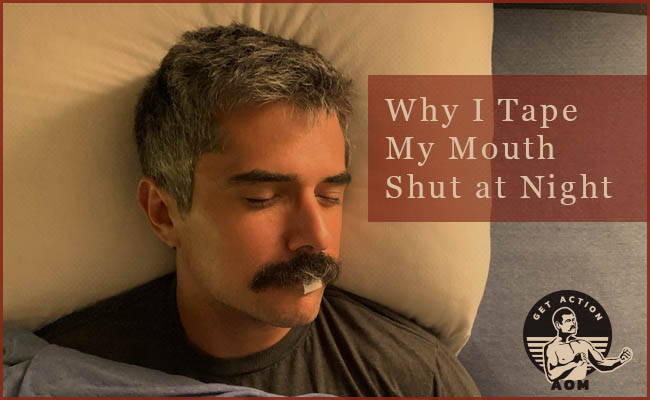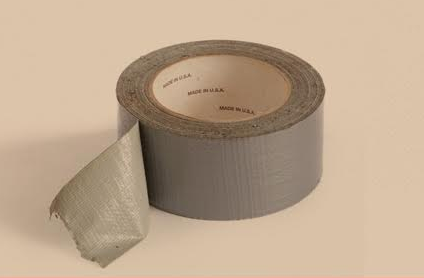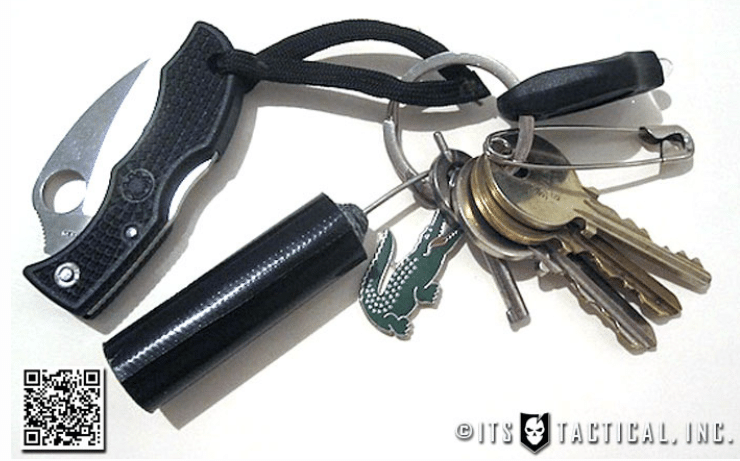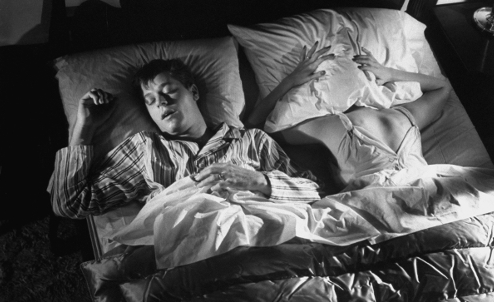
My bedtime routine for the past month or so has looked like this:
Take out contacts.
Brush and floss teeth.
Say prayers.
Read a book.
Tape mouth shut.
*Record scratch*
“Tape your mouth shut? Really, Brett? You weirdo.”
Yes, it is weird, but there’s a method to my weirdness.
I got the idea from reading Breath: The New Science of a Lost Art, in preparation for interviewing its author, James Nestor, for the podcast. In the book and in our interview, Nestor shares research on how breathing out of your mouth is bad for you, especially while you’re sleeping. He then shares an easy tip on how you can fix your chronic mouth breathing at night: taping your kisser shut.
Here’s why it works, and why, the initial weirdness factor aside, you might consider trying it yourself.
The Downsides of Nighttime Mouth Breathing
When Nestor dug into the research on breathing, he found that for thousands of years, and in diverse cultures around the world, the nose had been favored over the mouth as the primary pathway for inhalation. Air breathed through the former is richer in oxygen, and gets moistened and filtered in the nasal passages. Breathing through the mouth, on the other hand, lacks these benefits, and when engaged in excessively at night, can create the following problems:
Snoring. Inhaling air through your mouth vibrates the soft tissue in the back of your throat more than inhaling air through your nose does, and this vibration can result in snoring. What’s more, when you breathe through your open mouth, your tongue falls back into your throat, narrowing your airway. With your airway constricted, the air you breathe in is even more likely to generate snore-inducing reverberations in the tissue of the throat.
Snoring doesn’t just annoy your spouse; it can also be a sign of a more serious sleep issue, specifically . . .
Sleep apnea. Sleep apnea is a disorder in which your breathing is disrupted while you sleep. You experience periods in which your breathing pauses or becomes very shallow more often than is usual, and these cessations in breathing make your sleep less restful and restorative, leading to myriad health problems, including fatigue, high blood pressure, stress, depression, and headaches.
Mouth breathing at night is a significant contributor to sleep apnea. As discussed above, when you breathe through your mouth while you slumber, the airway in your throat constricts, causing snoring. When the soft tissue in the back of your throat collapses completely, your airway is obstructed, and you experience sleep apnea.
Nestor experienced this firsthand during an experiment he ran on himself in which he had his nose entirely plugged up by a doctor, and could only breathe through his mouth for 10 days. Having previously been only an occasional snorer, he began to snore for four hours each night and even started developing obstructive sleep apnea. Tests showed his body was under greater stress throughout his waking hours, and his blood pressure shot up 13 points, putting him in stage one hypertension. He also felt especially fatigued during the day.
Bad breath. If, upon waking, your breath smells like you ate a dirty diaper, it’s probably because you slept with your mouth open all night. Saliva is nature’s mouthwash. It has antibacterial agents in it that kill odor-causing bacteria. When you sleep with your mouth open, that bad-breath-destroying saliva dries up, resulting in stinky morning breath when you rise.
Periodontal disease. Keeping your gums healthy is largely a matter of keeping up a regular routine of brushing and flossing (not that the latter is always easy to do; here’s how I finally made flossing a habit myself). But stopping nighttime mouth breathing can also improve gum health. Saliva helps kill the bacteria in our mouths that cause gingivitis. And again, when you breathe with your mouth open at night, that saliva dries up, and those little bacteria can proliferate and fester, causing your gums to get inflamed.
Why We Mouth Breathe at Night
If mouth breathing at night is so bad for us, then why do we do it? There are several factors behind this common proclivity towards oral inhalation:
Nasal congestion. Many folks breathe through their mouths when their noses are stuffed up due to having allergies or a cold. But here’s the kicker: breathing through your mouth can actually increase nasal congestion, which makes you breathe through your mouth even more. It’s a vicious cycle!
“When the nasal cavity gets congested, airflow decreases and bacteria flourish,” Nestor notes in Breath. “These bacteria replicate and can lead to infections and colds and more congestion. Congestion begets congestion, which gives us no other option but to habitually breathe from the mouth.”
When Nestor had his nose plugged up for 10 days straight, turning him into a strict mouth breather, his sniffer got progressively more stuffed up as the bacteria in his sinuses increased. When the doctor running the experiment pulled the plugs out at the end, he ran an endoscope up Nestor’s nostrils and saw a soupy mess of congestion.
So how do you break the vicious cycle of mouth-breathing-induced nasal congestion so you can breathe through your nose again? Dr. Jayakar V. Nayak — the doctor who plugged Nestor’s nostrils — recommends starting off with a saline nasal spray and a low-dose steroid spray (like Rhinocort) to help open things up. Both can be bought over-the-counter at drug stores.
Once you get your nose decongested, you can start breathing through it again while you sleep.
Deviated septum. Another reason people breathe through their mouth while they sleep is that they have a deviated septum. A deviated septum occurs when the thin wall between your nasal passages has shifted off-center, making one nasal passage smaller than the other and reducing airflow. Congestion is more likely to occur in folks with this condition. Decongestants can help clear things up. Nasal reconstruction is usually needed to fix severely deviated septums.
Habit. If you aren’t congested and don’t have a deviated septum, but you still breathe through your mouth while sleeping, the reason is probably a learned propensity. Maybe you had a bout of bad congestion as a kid that caused you to sleep with your mouth open for weeks or months, resulting in you picking up the habit.
I know I’m in this group. As a kid, I’d get sinus infections every fall and winter, and for five months out of the year, I’d have a stuffed up nose that forced me to breathe through my mouth at night. Here I am thirty years later, and I still breathe mostly through my mouth when I sleep.
While I haven’t experienced sleep apnea, I do snore occasionally, wake up every morning with a dry mouth and bad breath, and get tsk-tsks from the dental hygienist about my gum inflammation.
So if you keep your mouth open at night while you sleep, how do you break the habit when you’re unconscious and dead to the world?
How a Little Piece of Tape Can Stop Nighttime Mouth Breathing
Easy. It keeps your mouth shut.
The idea is that the tape trains your lips to stay closed so that you primarily breathe through your nose. Eventually, nasal breathing will become habitual, and you won’t need the tape.
Training the mouth to stay shut at night isn’t a new idea. In Breath, Nestor notes that there are accounts of some Native American tribes in which mothers would gently shut their babies’ lips while they slept to train them to breathe through their noses. A 19th century doctor named George Catalin recommended tying a bandage around your jaw at night like the ghost of Jacob Marley to achieve the same effect.
In recent years, special “sleep tape” has been developed that you can attach to your mouth in elaborate ways. But breathing experts recommended a method to Nestor that’s simpler and dirt cheap.
Just buy some hypoallergenic micropore tape from your local drugstore. A roll will only set you back a buck. Before you go to sleep, tear a small square — all you need is a little strip about the size of a postage stamp — and place it right in the center of your closed lips. Putting it here keeps your mouth together and keeps some space on the sides of your mouth open if you feel like you need to breathe through your mouth or cough at night.
I started taping my mouth shut at night about a month ago and have been pleasantly surprised by the results. The first night it felt a bit awkward, to be sure. I remember waking up disjointed in the middle of the night trying to figure out why I couldn’t open my mouth. In my half-awake state I thought I had excreted some sort of goop that had dried up and sealed my lips shut, so I wiped my mouth really hard, taking the tape off in the process. The next night I made it all the way ‘til morning with the tape still on.
Kate hasn’t reported snoring from me, and my mouth feels less dry and doesn’t smell as bad. I’ve also noticed a lessening in my usual allergy-induced sinus congestion. I’ve had a few nights where I’ve been stuffed up going to bed, and in putting the tape on my mouth, I initially had to battle feeling like I was suffocating for a few minutes (having that space open on the sides of the tape gave me some air). But surprisingly, once the tape was on for awhile, my nasal passages started to clear up, and I could breathe just through my nose.
Overall, I’m happy with how this odd experiment has worked out for me. Has breathing through my nose while sleeping been a complete game-changer in my life? Not really, but because it’s such an easy thing to do and has a decent amount of upside, I think it’s worth it. The only downside is that it inhibits pillow talk with Kate; I can only make mumbling, grunting noises once I tape up and bed down.
If you don’t plan on trying to break the mouth breathing habit at night, at least try to focus on breathing through your nose during the day — when you can consciously control it. In my podcast interview with Nestor, he argued that shifting from mouth breathing to nasal breathing is the single biggest thing people can do to improve their breathing, and with it, their overall health.
Listen to my interview with Nestor for more interesting insights about breathing:







